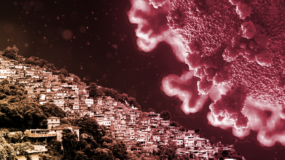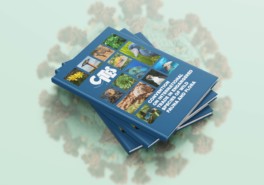Posted on 08 Apr 2020
As the number of confirmed COVID-19 cases worldwide surpasses 1.3 million, the risks posed by the pandemic – not just from the global health perspective, but also from an economic, development and security outlook – are exposed more and more each day.
This week’s accompanying policy brief and podcast explore the worrying increase in cybercrime witnessed across the globe. Hackers are taking advantage of the uncertainty caused by the pandemic, and the sector that is most crucial to containing the spread of COVID-19 is perhaps also the most vulnerable to ransomware attacks: healthcare. At the same time, our increasing online presence is exposing us to new threats.
Check out the brief here and listen to our podcast series, The Impact: Coronavirus and Organized Crime.
Last week’s #CovidCrimeWatch focused on the Latin America region, where gangs are adapting to this new world in which we live, imposing curfews on communities in the absence of strong government action and reorganizing their extortion practices in response to the barriers to trade that have been erected as a result of the disease.
In our third edition of this newsletter, the focus shifts towards the impact of COVID-19 on environmental crime and the illicit wildlife trade. As economies around the world slow down as a result of the coronavirus, what impact does a reduction in demand for certain commodities, such as rosewood or gold, have on illicit economies? We also explore the effect of the pandemic on the global wildlife trade, and the potential implications on trade volumes and market dynamics.
Never a rose without the prick
Reuters, 31 March 2020
Accounting for at least 80% of
the world’s rosewood logs, West and Central Africa are the primary source
countries for the endangered species. China is recognized as one of the largest
consumer markets for rosewood, the most trafficked endangered species in the
world. But the outbreak of the coronavirus in the Asian giant was inevitably
going to have an impact on the illegal trade, and reports from Sierra Leone,
one of the countries devastated by the illegal export of rosewood, suggest the
effects are already being seen.
Demand for
rosewood in China has plummeted in recent times, and this has led to an abrupt
halt in illegal logging in Sierra Leone’s Outamba-Kilimi national park. The
local loggers’ customer base is composed almost exclusively of Chinese
nationals, and as a result of the near-complete standstill in international
travel, they are no longer able to make the journey to the small West African
country to buy the rosewood.
However, although
the drastic reduction in demand for rosewood may be a welcome silver lining of
the dark cloud that is coronavirus, it is likely to have a hugely detrimental
impact on the local loggers, whose sole livelihood is the little money they
make from the trade.
Golden opportunity for criminal actors
Reuters, 31 March 2020
The law of supply and demand is one of the most
rudimentary economic principles, and gold miners in South America and Africa
are feeling the full force of its effect. As a result of a number of government
interventions across the world, the price of gold has collapsed in many places,
such as Zimbabwe and Colombia, leaving subsistence miners high and dry. Now,
COVID-related border closures and travel restrictions are exerting a further impact
on the market, as buyers are no longer able to move the gold into countries in
which they can make a profit from it. Currency controls, such as those imposed
in Suriname, and government-imposed suspensions of artisanal mining, for
example in Mali, are other instances of policies that have pushed the price of
gold down to potentially unsustainable levels. In some countries, informal gold
miners are forced to sell their gold at almost 40% discounts.
There are, however, some who will appreciate
the drop in gold prices. In the first episode of the GI-TOC podcast, The Impact: Coronavirus and
Organized Crime, Marcena Hunter warned that a reduction in gold prices will provide the
perfect opportunity for criminal actors to invest in and stockpile gold until
global markets reopen, when they will then be able to sell the commodity at a
profit.
Ban wet markets to dry up illegal wildlife trade
The Guardian, 6 April 2020
The form of
the coronavirus that has led to the pandemic is thought to have originated in a
wet market in Wuhan, where a range of common and exotic animals, both dead and
alive, were sold for human consumption. The Huanan Seafood Wholesale Market was
closed by authorities on 1 January, and a temporary ban on wildlife trade was
announced by the Chinese government shortly afterwards. But the acting
executive secretary of the UN Convention on Biological Diversity has called for
a permanent global ban on markets selling live animals to prevent future
outbreaks of viruses likely to be propagated by wildlife.
However, a ban
on live animal markets across the world may have a devastating impact on the
livelihoods of a huge number of communities, particularly in low-income rural
areas, that rely on the wildlife trade. Such a ban may simply force the
wildlife trade underground, leading to an increase in illegal trade. It is
crucial, therefore, that if a global ban on wildlife markets were to be
imposed, a comprehensive, sustainable strategy is implemented to replace the
source of income upon which millions depend.
China sends mixed messages on wildlife crime
Environmental Investigation Agency, 23 March
2020
Following the positive
action taken by authorities in China, as outlined in the previous story, the Chinese
government have included Tan Re Qing, an injection containing bear bile, on a
list of recommended treatments for severe and critical cases of COVID-19. Bile
from various species of bears has been used in traditional Chinese medicine for
over a dozen centuries at
least, but there is no evidence to suggest that it is in any way a cure for the
novel coronavirus.
Although the
use of bile drawn from captive animals in China is permissible by law, importing
the substance from other countries is illegal. The consequence is that, by
advocating the use of bear bile as a remedy, the government risks stimulating
demand for the product, which will trigger an increase in the illegal trade in wildlife
products. Furthermore, there is a real risk that, with physical markets shut
down, much of the trade will move online. Indeed, recent reports
suggest this is already the case. Last year, findings from the GI-TOC’s Digital Dangers
initiative suggested that the illegal wildlife trade on online platforms has
been increasing in recent years. The growth in cyberspace usage to market illegal
wildlife poses numerous challenges,
including greater anonymity for traders and bigger challenges around legal
jurisdiction and law-enforcement capabilities.
Wildlife crime remains on the radar
France24, 1 April 2020
Malaysian
customs authorities have seized approximately six tonnes of pangolin scales and
dismantled a trafficking syndicate. The animal parts, which are commonly used
in traditional Chinese medicine, despite there being no evidence to suggest
they have any therapeutic value, were found in a container at a port near Kuala
Lumpur, hidden among a shipment of cashew nuts.
As governments
across the world are rightly focusing their attention on the coronavirus
pandemic, the Malaysian authorities at the same time appear to be committed to
tackling illegal wildlife crime, an increasingly prominent issue given the
likely origins of the virus. Criminal actors involved in the illegal wildlife
trade, as well as the drugs trade and other illicit economies, are likely to
try to exploit distracted law-enforcement agencies, who are ‘looking the other
way’ – not least in certain Asian
countries where paramilitarized police forces are not properly trained to deal
with a pandemic. As examined in the Crime and Contagion
report, the GI-TOC’s network in several regions have already reported
developments to suggest that criminal networks are seeking to leverage the
institutional overstretch caused by the pandemic and are actively using
disinformation to create new markets.
READ MORE:



